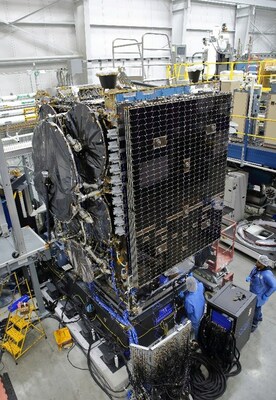Viasat's Broadband Arctic Extension Closer as Spacecraft Complete Key Tests
- Completion of thermal vacuum testing for the second satellite in the Arctic Satellite Broadband Mission is a significant milestone
- The mission will deploy two satellites in a highly elliptical orbit (HEO) in the world's first HEO mission carrying a broadband commercial service payload
- The two satellites will host Viasat's GX-10a and GX-10b Ka-band payloads, extending Viasat's high-speed global network across the Arctic region
- The spacecraft are designed to integrate as part of Viasat's wider satellite fleet and extend the coverage of its Ka-band network beyond that available from geostationary satellites
- The UK Government's Environmental Audit Committee has called for a greater political focus on the Arctic region and further research into the potential environmental and economic impacts of changing weather patterns, which may pose regulatory challenges for the mission
The Arctic Satellite Broadband Mission is set to launch two satellites with SpaceX from Vandenberg Air Force Base,
The mission, led by the Space Norway subsidiary Heosat, will see two satellites deployed in a highly elliptical orbit (HEO) in the world's first HEO mission carrying a broadband commercial service payload. The two satellites – ASBM-1 and ASBM-2 – will host Viasat's GX-10a and GX-10b Ka-band payloads, extending Viasat's high-speed global network across the Arctic region.
The spacecraft are designed to integrate as part of Viasat's wider satellite fleet and extend the coverage of its Ka-band network beyond that available from geostationary satellites. The payloads will be Viasat's first in non-geostationary orbit and will become a key element of its co-operative hybrid network. Once launched, these new payloads will increase Viasat's fleet size to 20, with an additional eight under development.
The Arctic has rapidly growing connectivity needs to serve governments, shipping companies, commercial airlines, and scientists. In October 2023, the
Mark Dickinson, Head of Space Systems, Viasat, said: "We have been talking with our customers, partners, and shareholders about how the combination with Inmarsat has given us a new scale and scope to deliver new solutions to meet our customers' requirements. This is an example of what that means in practice. The investment we've made in our network is creating the flexibility, coverage, and interoperability to meaningfully connect the world wherever and whenever our customers need it – even if they happen to be standing on the North Pole."
Space Norway Program Director, Kjell-Ove Skare, said: "With both satellites through the thermal vacuum test we are really closing in on making this strategically important capability real. We have seen an unprecedented collaborative effort with Viasat, the US Space Force, our Norwegian Armed Forces and with Northrop Grumman, and are all looking forward to providing the first dedicated broadband services to users in the real Arctic."
The ASBM-1 and ASBM-2 spacecraft will now undergo their final testing and readiness activities. Once complete, they will be transferred to Vandenberg Space Force Base,
About Viasat
Viasat is a global communications company that believes everyone and everything in the world can be connected. With offices in 24 countries around the world, our mission shapes how consumers, businesses, governments and militaries around the world communicate and connect. Viasat is developing the ultimate global communications network to power high-quality, reliable, secure, affordable, fast connections to positively impact people's lives anywhere they are—on the ground, in the air or at sea, while building a sustainable future in space. On May 30, 2023, Viasat completed its acquisition of Inmarsat, combining the teams, technologies and resources of the two companies to create a new global communications partner. Learn more at www.viasat.com, the Viasat News Room or follow us on Facebook, Instagram, LinkedIn, X or YouTube.
Copyright © 2023 Viasat, Inc. All rights reserved. Viasat, the Viasat logo and the Viasat Signal are registered in the
Forward-Looking Statements
This press release contains forward-looking statements that are subject to the safe harbors created under the Securities Act of 1933 and the Securities Exchange Act of 1934. Forward-looking statements include, among others, statements that refer to the GX10 program, including the coverage, features, availability and planned timing of the ASBM-1 and ASBM-2 satellites. Readers are cautioned that actual results could differ materially from those expressed in any forward-looking statements. Factors that could cause actual results to differ include: our ability to realize the anticipated benefits of the GX10a and b satellite payloads as part of the Arctic Satellite Broadband Mission and any future satellite we may construct or acquire; unexpected expenses related to our satellite projects; our ability to successfully implement our business plan for our broadband services on our anticipated timeline or at all; risks associated with the construction, launch and operation of satellites, including the effect of any anomaly, operational failure or degradation in satellite performance; our ability to successfully develop, introduce and sell new technologies, products and services; changes in the global business environment and economic conditions; introduction of new technologies and other factors affecting the communications industry generally; the effect of adverse regulatory changes (including changes affecting spectrum availability or permitted uses) on our ability to sell or deploy our products and services; changes in the way others use spectrum; our inability to access additional spectrum, use spectrum for additional purposes, and/or operate satellites at additional orbital locations; competing uses of the same spectrum or orbital locations that we utilize or seek to utilize. In addition, please refer to the risk factors contained in our SEC filings available at www.sec.gov, including our most recent Annual Report on Form 10-K and Quarterly Reports on Form 10-Q. Readers are cautioned not to place undue reliance on any forward-looking statements, which speak only as of the date on which they are made. We undertake no obligation to update or revise any forward-looking statements for any reason.
![]() View original content to download multimedia:https://www.prnewswire.com/news-releases/viasats-broadband-arctic-extension-closer-as-spacecraft-complete-key-tests-301994296.html
View original content to download multimedia:https://www.prnewswire.com/news-releases/viasats-broadband-arctic-extension-closer-as-spacecraft-complete-key-tests-301994296.html
SOURCE Viasat, Inc.
FAQ
What is the Arctic Satellite Broadband Mission and when is it set to launch?
What are the key features of the two satellites in the Arctic Satellite Broadband Mission?









